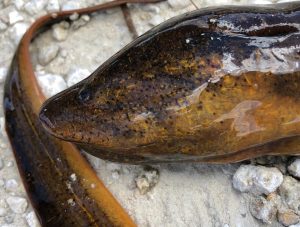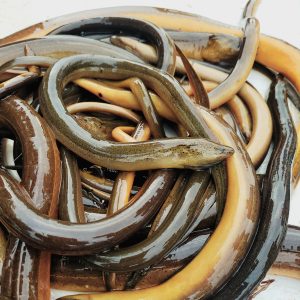
The University of Florida, in partnership with the U.S. Geological Survey, U.S. Army Corps of Engineers, and other agencies, encourages the public to report sightings of the invasive Asian swamp eel, detected in Florida’s waterways over two decades ago.
Scientifically known as Monopterus albus, the Asian swamp eel is a unique, air-breathing fish native to Southeast Asia, thriving in muddy, stagnant waters. First detected in Florida in 1997, the species has established in numerous parts of the country, including Hawaii and Georgia. There is increased concern about their population growth throughout the southeast, particularly Florida.
People in Florida’s waterways are urged to report through the USGS Nonindigenous Aquatic Species website, EDDMapS website or App or FWC’s 888-Ive-Got-1 hotline.
Scientists are concerned about the potential for invasion in new waterways and the detrimental effects it could have on Florida’s biodiversity. Additionally, there are concerns about unknown impacts on freshwater systems, which support recreational and commercial fishing industries.

“Florida’s aquatic habitats are vital to our ecosystem and economy, and invasive species like the swamp eel can cause irreversible damage to our biodiversity,” said Paul Evans, research coordinator for the UF/IFAS Invasion Science Research Institute (ISRI). “Like any invasive species their function as a novel predator is what is most harmful to our native species.”
Here is what scientists know about the Asian swamp eel:
- Known for its ability to thrive in a variety of aquatic environments, swamp eels are highly adaptable and capable of surviving in a variety of environments, from slow-moving streams to marshes and wetlands.
- They are opportunistic feeders, consuming a wide range of prey, including small fish, amphibians and invertebrates.
- The species has the potential to disrupt food webs and harm native biodiversity, leading to ecological shifts in affected areas.
- Swamp eels can reproduce prolifically, making it difficult to control their population once they become established.
- Commonly sold as bait which can lead to unintentional baits, and is released as a part of a cultural practices
“Public involvement is critical in identifying and managing the spread of swamp eels. There is so much more we need to learn and all that starts with identifying them and raising awareness,” said Evans.
###
By Lourdes Mederos, rodriguezl@ufl.edu
ABOUT UF/IFAS
The mission of the University of Florida Institute of Food and Agricultural Sciences (UF/IFAS) is to develop knowledge relevant to agricultural, human and natural resources and to make that knowledge available to sustain and enhance the quality of human life. With more than a dozen research facilities, 67 county Extension offices, and award-winning students and faculty in the UF College of Agricultural and Life Sciences, UF/IFAS brings science-based solutions to the state’s agricultural and natural resources industries, and all Florida residents.
ABOUT ISRI
The mission of the University of Florida Invasion Science Research Institute (UF/IFAS ISRI) is to facilitate interdisciplinary research that advances our understanding of the causes and consequences of invasive species; generates innovative approaches to reduce invasions and their impacts on natural, agricultural, and urban systems; and train the next generation of invasion scientists. UF/ISRI has over 190 affiliates and collaborators with a variety of backgrounds and expertise.
invasionscience.ufl.edu | @invasionscience_uf
 1
1
